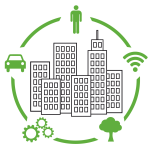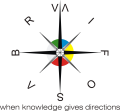
|

|

|
|
|
CITIES 20.50 Creating Habitats for the 3rd Millennium: Smart – Sustainable – Climate Neutral Urbanisation of the world is progressing rapidly and seems to be an unstoppable process. According to current forecasts, more than 6 billion people will live in cities in 2050. Compared to 1950, this is almost a tenfold increase in 100 years, resulting from global population growth and the continuing influx of people into urban areas. As a rule, population growth also means additional land requirements. Urban growth often takes place across administrative borders, cities grow into their surrounding areas, (cross-border) urban and metropolitan regions emerge and also influence the development of rural areas, where in turn numerous initiatives for independent sustainable development emerge. This dynamic development is accompanied by enormous challenges for the organisation and maintenance of urban processes, particularly in the areas of technical and social infrastructure, affordable housing, mobility, recreation, security of supply, etc. Sustainability, resilience and smartness are essential characteristics of cities and regions and are often compared by means of benchmarks. The key question is how quality of life can be maintained and improved in the face of dynamic development of living space. Even though the world is currently under the spell of the COVID-19 pandemic, it is clear that climate and environmental issues will be decisive for urban development in the coming decades. Climate adaptation strategies will play a central role, because especially in cities, high density, increasing land sealing, lack of greenery and inadequate ventilation increasingly lead to the formation of urban heat islands and the problem of urban warming. How can urban and spatial planning and all related disciplines contribute to maintaining urban flows, functioning infrastructure and preserving and improving the quality of life? How can urban and rural living spaces actively cross-fertilise each other's development? REAL CORP invited for contributions from all areas of expertise to gain a holistic and multi-faceted view on challenges and future scenarios in the urban realm. Next to science-based contributions we also had practise-based reports on short term actions and/or long-term strategies on urban and regional development. We reflected on the global COVID crisis in a special track and received highly interesting contributions dealing with human well-being, public health, blue and green as critical infrastructure and the role of planning and mitigating strategies before, during and after the pandemic. |
 |
 |
 |
||||||||
 |
 |
 |
||||||||
 |
 |
 |
 |
 |
 |
|||||

